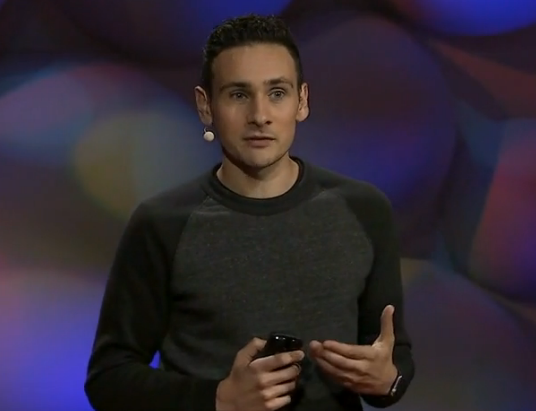(单词翻译:单击)
听力文本
So, take for example human emotion.
以人类的情感为例。
Right now, computers can make sense of our most basic ones,
如今,电脑能够明白我们的基本情感,
like joy, sadness, anger, fear and disgust, by converting those characteristics to math.
比如开心、伤心、生气、恐惧、厌恶,把这些特征转化为数学。
But what about the more complex emotions?
那较复杂的情感呢?
You know, those emotions that we have a hard time describing to each other? Like nostalgia.
比如那些很难用文字向对方描述的情感,比如,怀旧。
So, to explore this, I created a piece of art, an experience, that asked people to share a memory,
所以,为了探索这个问题,我创造了一件艺术品,一种体验,要求人们分享他们的记忆,
and I teamed up with some data scientists to figure out how to take an emotion that's so highly subjective
我和一些数据科学家组成一个团队,去研究高度主观的情感是怎样的,
and convert it into something mathematically precise.
如何将它们精确地转化为数学。
So, we created what we call a nostalgia score and it's the heart of this installation.
我们创造了一个叫怀旧分数的东西,这是这个装置的核心。
To do that, the installation asks you to share a story, the computer then analyzes it for its simpler emotions,
这个装置会要求你分享一则故事,电脑会分析它的一些简单的情感,
it checks for your tendency to use past-tense wording
它会检测你使用过去时态的词语的偏好,
and also looks for words that we tend to associate with nostalgia, like "home," "childhood" and "the past."
还会寻找与怀旧有关的词语,比如“家”、“童年”和“过去”。

It then creates a nostalgia score to indicate how nostalgic your story is.
它最后会给出一个怀旧分数,代表着你的故事的怀旧程度。
And that score is the driving force behind these light-based sculptures that serve as physical embodiments of your contribution.
这个分数会让这个灯箱的颜色发生变化,代表着你的贡献。
And the higher the score, the rosier the hue. You know, like looking at the world through rose-colored glasses.
分数越高,色调越偏向玫瑰红色。就像是通过玫红色的眼镜看世界。
So, when you see your score and the physical representation of it, sometimes you'd agree and sometimes you wouldn't.
当你看到你的分数,以及它的外部反映时,有时你会赞同,有时不赞同。
It's as if it really understood how that experience made you feel.
有的时候就好像它真的明白故事里的你当时的感受。
But other times it gets tripped up and has you thinking it doesn't understand you at all.
但有的时候它也会出错,会让你觉得它一点也不懂你。
But the piece really serves to show that if we have a hard time explaining the emotions that we have to each other,
但这个装置能够说明,如果连我们都很难表述清楚的情感,
how can we teach a computer to make sense of them?
我们该如何教电脑明白呢?
演讲介绍
怎样才能让人类真正地与人工智能进行互动?拉斐尔·阿拉尔建议我们从创造艺术开始。他分享了能让人工智能探究复杂想法的交互项目,例如怀旧、直觉、对话——所有的工作都在朝着将来人工智能尽可能和人类一样的目标而努力。


